Partition Act 1893- Resolve Family Property Disputes & Partition Cases
In India, conflicts over partition of property are one of the leading causes of civil litigation. Families often live together for generations, and when the time comes to divide assets, disagreements naturally arise. A typical property dispute between brothers, cousins, or other co-owners may involve ancestral houses, agricultural lands, commercial premises, or even modern real estate investments. Such conflicts can quickly escalate, particularly in cases involving boundary disputes or when one co-owner refuses to cooperate in the division. In these situations, the law recognizes the need for a formal legal partition to ensure fairness and protect the rights of all stakeholders.

The need for an orderly process of partition of joint family property led to the enactment of the Partition Act. This law provides a statutory framework that allows courts to intervene when co-owners cannot reach an amicable solution. Its primary objective is to balance the interests of all parties by determining whether a physical division is possible or whether selling the property and dividing the proceeds would be more equitable. This makes the Act a cornerstone of partition law in India.
Unlike informal family arrangements, the Partition Act ensures that disputes are addressed with legal finality. For example, in cases where the partition of land into equal shares is not feasible—such as a single house located in a congested urban area—the court may order a sale of the property and distribute the money among co-owners. This judicial approach reduces the chances of prolonged hostility, ensuring that no co-owner is unfairly deprived of their rights.
It is important to note that the partition of property in India is not merely about dividing land or assets; it is about protecting relationships and ensuring justice. The law recognizes that family bonds can easily be strained when questions of ownership arise. By introducing a legal remedy, the Partition Act has provided individuals with a structured and fair way to settle disputes while minimizing long-term conflicts.
What is the Partition Act 1893?
The Partition Act, 1893 is a landmark piece of legislation in Indian partition law, enacted to provide clarity and fairness in cases where multiple co-owners share rights over the same property. Before this Act, disputes over the partition of property—especially among families—were resolved through cumbersome civil procedures that often left one or more parties dissatisfied. The Partition Act simplified this process by empowering courts to step in when co-owners cannot mutually agree on a fair division of assets.
The primary purpose of this Act is to ensure the equitable distribution of property among co-owners. In many cases, the physical division of property is either impractical or impossible. For example, a single-family home or a small piece of agricultural land cannot always be divided without destroying its value or usability. In such situations, the Partition Act gives courts the authority to order a sale of the property and distribute the proceeds among the co-owners, ensuring that every stakeholder receives a fair share. This provides a reliable solution to complex disputes involving legal partition of property.
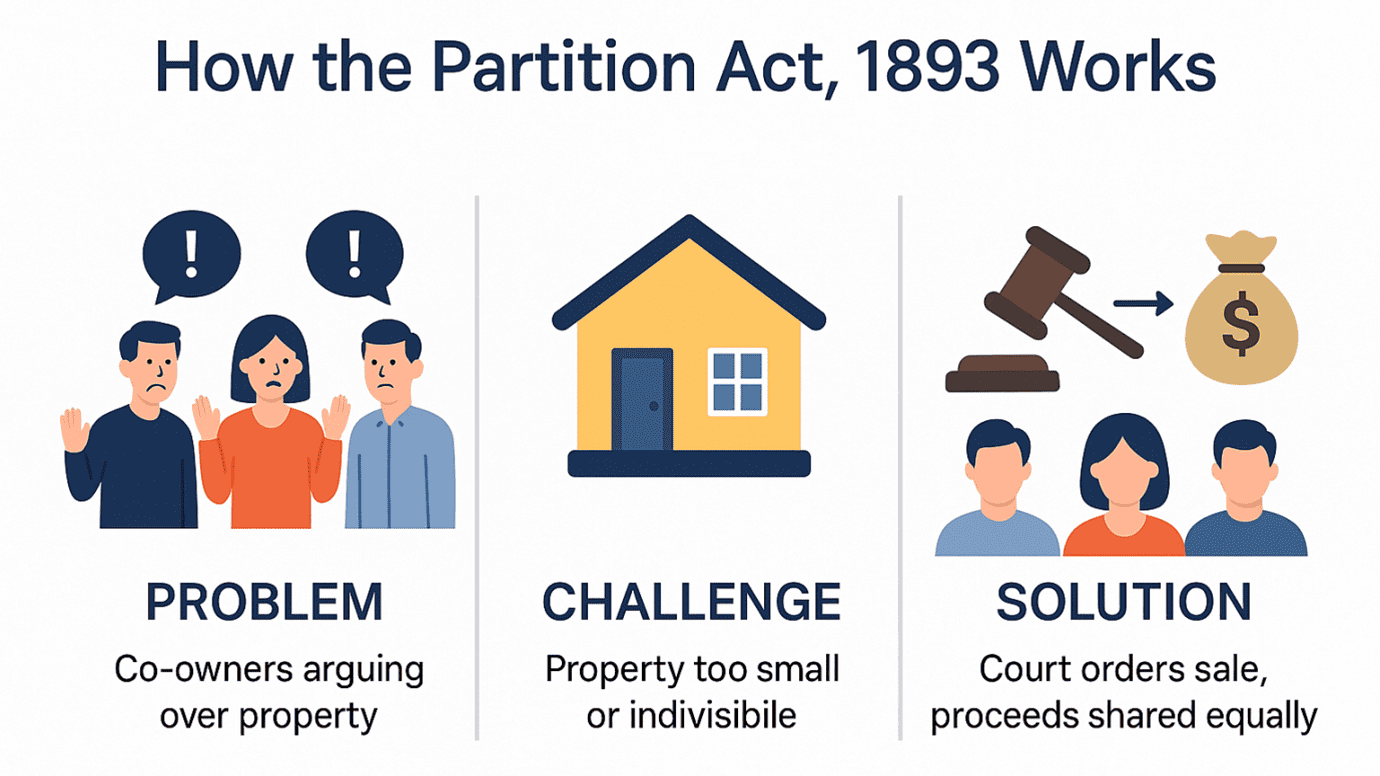
In essence, the Partition Act ensures that disputes are not left unresolved due to the limitations of physical division. Instead, it creates a structured path for courts to deliver justice by balancing the rights of all co-owners, whether through an act of partition or by distributing sale proceeds. For individuals dealing with issues such as the legal partition of property, the Act continues to be a cornerstone of Indian partition law.
When Does the Partition Act Apply?
The Partition Act 1893 plays a critical role in resolving family property disputes and conflicts involving multiple co-owners of the same property. The Act comes into effect primarily when the partition of property cannot be carried out in practical, physical terms. In other words, if dividing the property would lead to an unfair outcome, destroy its utility, or reduce its market value, the court may rely on the Act to ensure justice through equitable distribution.
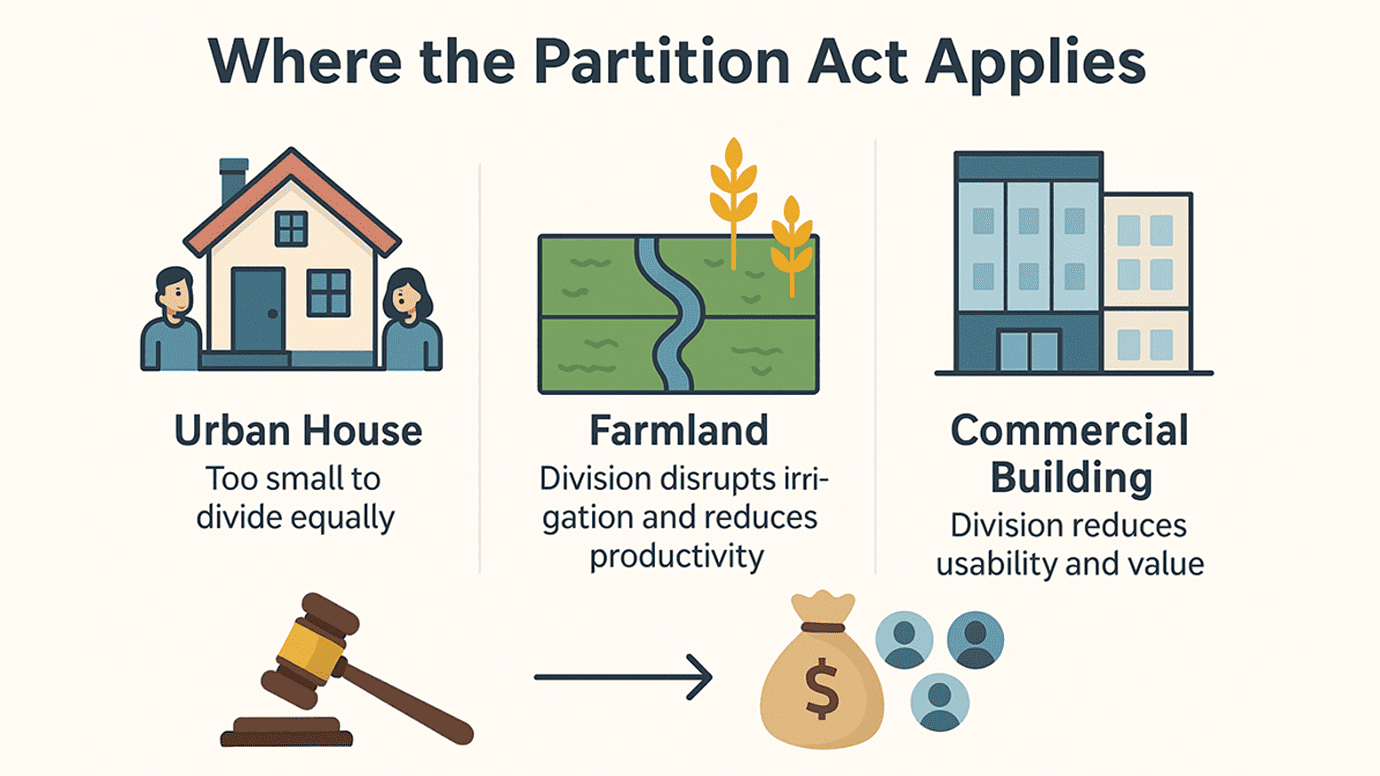
A classic situation where the Partition Act 1893 applies is when co-owners cannot agree on the act of partition. For example, a small urban house may not be suitable for division into equal portions without rendering it unlivable. Similarly, in cases involving agricultural fields, dividing the land might affect irrigation or reduce its overall productivity. In such circumstances, instead of forcing a physical division of the property, the court may order a sale and then distribute the proceeds fairly. This approach ensures that no co-owner is disadvantaged simply because the partition land cannot be conveniently divided.
The Act is most often invoked in disputes between co-owners of immovable property, such as land, houses, or commercial buildings. A property dispute between brothers over ancestral land is a common example. If one brother insists on a physical division while another prefers a sale, the court will assess the feasibility of division under partition law. If the division is not practical, the provisions of the Act guide the court to order a sale. This ensures that both parties receive their rightful share without unnecessary conflict.
The Partition Act is also applicable in cases involving the partition of joint family property, where several family members inherit rights over the same house or farmland. Disputes often arise when some heirs want to retain ownership, while others demand a sale. Such disputes can become complicated, particularly when boundary disputes arise, or when the property cannot be divided into equal and usable parts. Here, the Act provides a legal solution by balancing competing interests.
In short, the Partition Act applies to situations where the legal partition of property cannot be achieved through direct physical division. It is especially relevant to partition of property in India involving ancestral assets, and cases of boundary disputes or inherited land. By providing courts with the authority to order a sale and distribute proceeds, the Act safeguards the rights of all co-owners and prevents prolonged litigation.
Key Provisions of the Partition Act
The Partition Act 1893 lays down specific provisions to guide courts in resolving family property disputes where the partition of property is contested. These provisions balance the interests of co-owners and ensure a fair outcome, whether through an act of partition or by ordering a sale. Below are the key sections explained in simple terms:
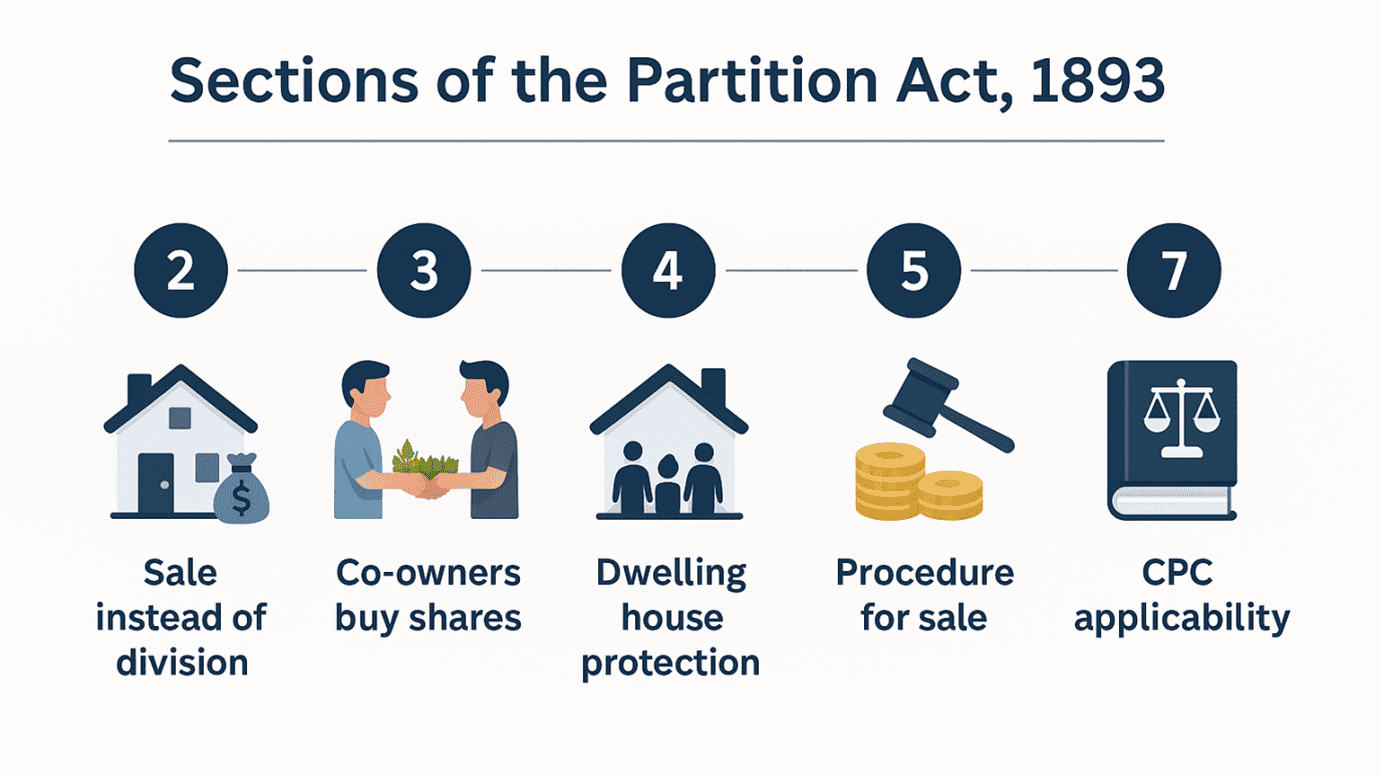
Section 2 – Right to Apply for Sale Instead of Division
- When co-owners cannot agree on the physical division of property, any shareholder may request the court to order a sale.
- This provision is particularly useful in partition cases where dividing the property would lower its value or make it unusable.
- Example: In a property dispute between brothers over a single ancestral house, if physical division is not possible, Section 2 allows for sale and equal distribution of proceeds.
Section 3 – Right of Co-owners to Buy Others’ Shares
- To prevent outsiders from entering the family property, this section allows co-owners to purchase the shares of those who want to sell.
- It protects the integrity of the family property, ensuring that ancestral homes remain within the family.
- Example: If one brother wants to sell his share of agricultural land, the other brother can buy it before it is sold to a third party.
Section 4 – Dwelling House Protection (Family Homes)
- This section provides special protection for family property involving dwelling houses.
- If a non-family member acquires a share in the house, existing family members can prevent them from taking possession by buying out their share.
- This prevents boundary disputes and protects family harmony.
Sections 5 & 6 – Procedure for Sale
- These sections detail how the sale of property should be conducted when ordered by the court.
- The process ensures transparency, fairness, and maximum value for the co-owners.
- Typically, the property is sold via public auction or another fair method, and proceeds are distributed as per ownership rights.
Section 7 – Applicability of Civil Procedure Code (CPC)
- This section ensures that all proceedings under the Partition Act follow the rules of the Civil Procedure Code (CPC).
- It provides a structured process for filing a partition suit and ensures consistency in judgments.
- This makes the Act fully integrated with broader Indian civil law, giving more reliability to outcomes.
Together, these provisions of the Partition Act ensure that disputes over the partition of property in India are handled fairly. By providing options for both division and sale, it remains a crucial safeguard in family property disputes across India.
Remedies Available under the Partition Act
The Partition Act 1893 provides several remedies to ensure fair resolution of family property disputes in India. These remedies are designed to protect the rights of co-owners and prevent unnecessary escalation of disputes, whether they involve ancestral homes, agricultural land or urban properties. Below are the key remedies available under this crucial piece of partition law:
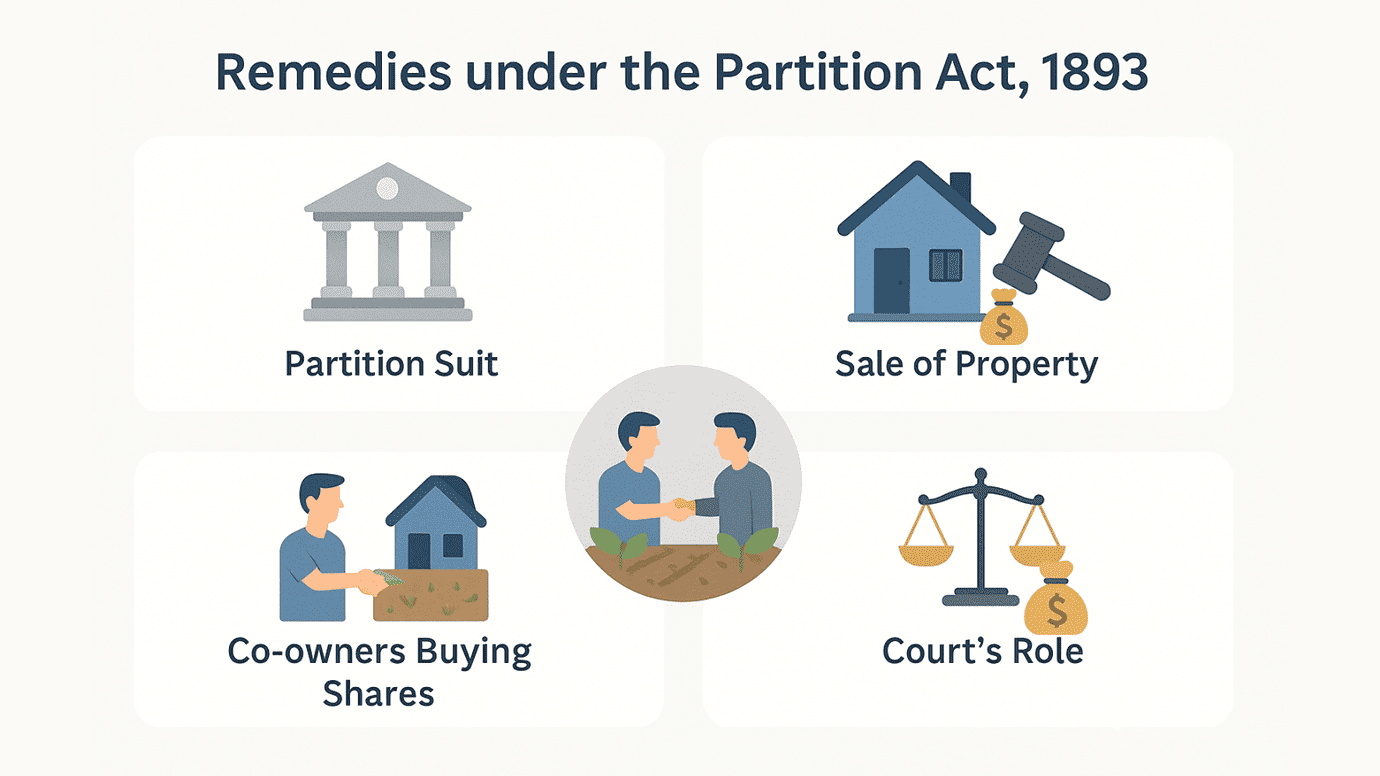
Right to Seek a Partition Suit
- Any co-owner has the right to file a case by initiating a partition suit in the civil court.
- Through this process, the court examines the feasibility of carrying out an act of partition—that is, physically dividing the property among the co-owners.
- This remedy is often sought in cases of joint family property, where family members want their individual share separated.
Right to Seek Sale of Property
- When the court determines that physical division of the property is not possible or practical, co-owners can request the court to order a sale under the Partition Act 1893.
- For example, in a property dispute between brothers over a small ancestral house, dividing the structure may not be feasible. In such cases, the property can be sold, and the proceeds fairly distributed.
- This remedy is especially helpful in avoiding boundary disputes or situations where dividing land would harm its utility.
Right of Co-owners to Buy Each Other’s Shares
- To prevent outsiders from entering family ownership, the Act gives co-owners the first right to purchase each other’s shares before the property is sold publicly.
- This protects the sanctity of the joint family property and keeps ancestral homes within the family.
- Example: If one co-owner wants to sell his share of farmland, another family member can exercise this right to buy it, preventing external interference in the family property.
Court’s Role in Ensuring Fair Distribution
- The court plays a central role in implementing the remedies of the Partition Act.
- It ensures that the legal partition of property—whether by physical division or by sale—is carried out transparently and equitably.
- The court also ensures that the value of property is properly assessed, so that no co-owner suffers financial loss during the partition case.
- By following the partition suit procedure, courts safeguard the interests of all stakeholders and provide closure to disputes that could otherwise drag on for years.
The remedies under the Act are designed to address both the practical and emotional aspects of family property disputes. By offering options for both physical division and sale, and by giving co-owners priority rights, it continues to be one of the most important safeguards in Indian partition law.
Procedure for Partition of Property in India
The process of resolving family property disputes under the Act follows a defined judicial framework to ensure fairness and legal validity. When disagreements over the partition of property in India arise, the court follows specific steps to reach a resolution. Below is the step-by-step partition suit procedure:
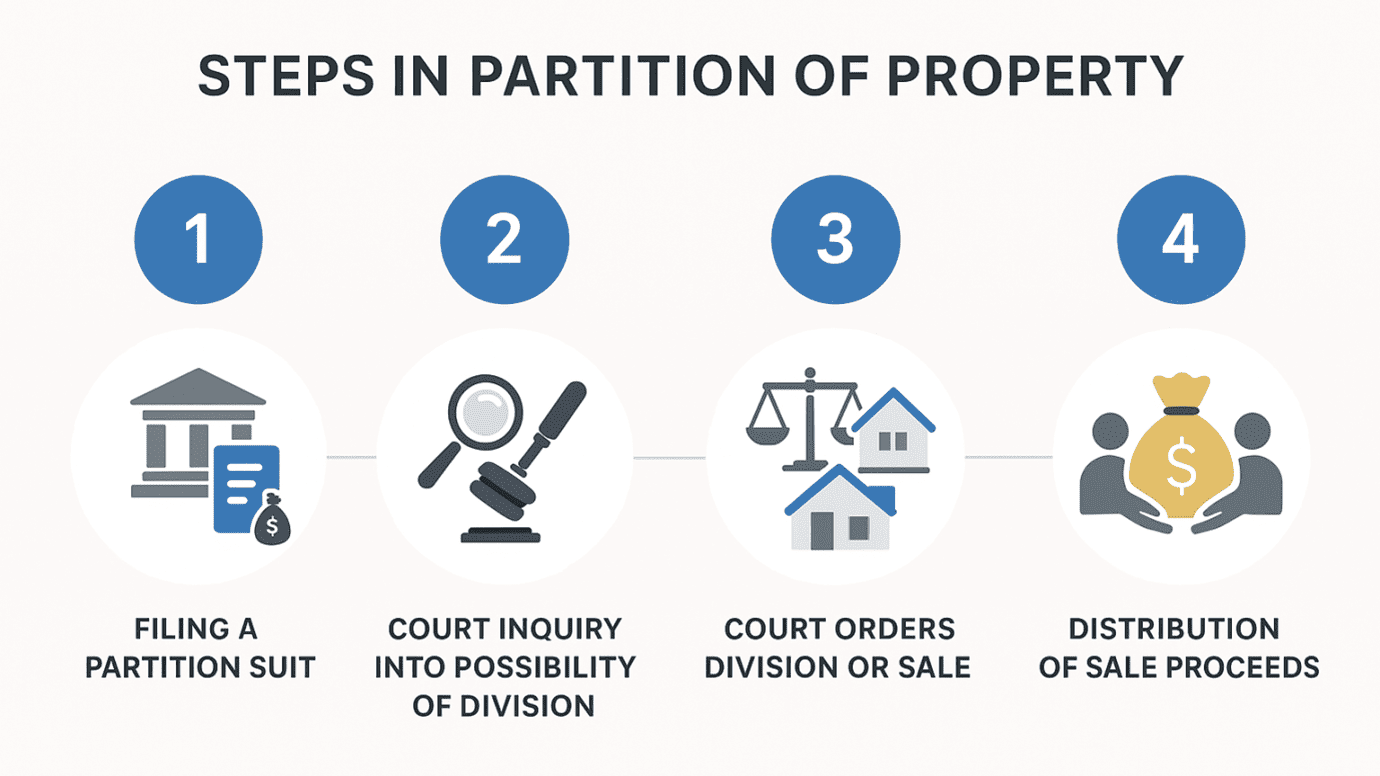
Step 1: Filing a Partition Suit in Civil Court
- The first step in any partition case is filing a suit before the appropriate civil court.
- Any co-owner who feels deprived of their rightful share can initiate this process, seeking a legal partition of property.
- The suit must include details of ownership, type of property (such as partition land, ancestral home, or commercial property), and the share claimed.
Step 2: Court’s Inquiry into Possibility of Division
- The first step in any partition case is filing a suit before the appropriate civil court.
- Any co-owner who feels deprived of their rightful share can initiate this process, seeking a legal partition of property.
- The suit must include details of ownership, type of property (such as partition land, ancestral home, or commercial property), and the share claimed.
Step 3: Court Orders Sale or Division
- If the court determines that physical division is feasible, it orders an act of partition, distributing the property among co-owners as per their share.
- However, if division is impractical, the court may invoke the Partition Act to order the sale of the property.
- This provision is especially useful in cases of joint family property where physical division would cause disputes or reduce property value.
Step 4: Distribution of Sale Proceeds
- Once the sale is completed, the proceeds are distributed among the co-owners according to their legal share.
- The court ensures transparency in the process so that no co-owner suffers financial loss.
- This remedy is particularly important in family property disputes and ensuring closure for all parties involved.
The procedure for partition of property in India ensures that disputes are resolved through a fair and structured approach. By providing clarity in the partition suit procedure, the law ensures that even the most complex disputes are handled efficiently under Indian partition law.
Challenges & Common Issues in Partition Cases
While the Partition Act 1893 provides a strong legal framework for resolving family property disputes, the road to achieving a fair outcome is not always smooth. Many cases in India face hurdles that complicate the process of legal partition of property. These challenges are not only legal but also deeply personal. Some of the most common issues include:
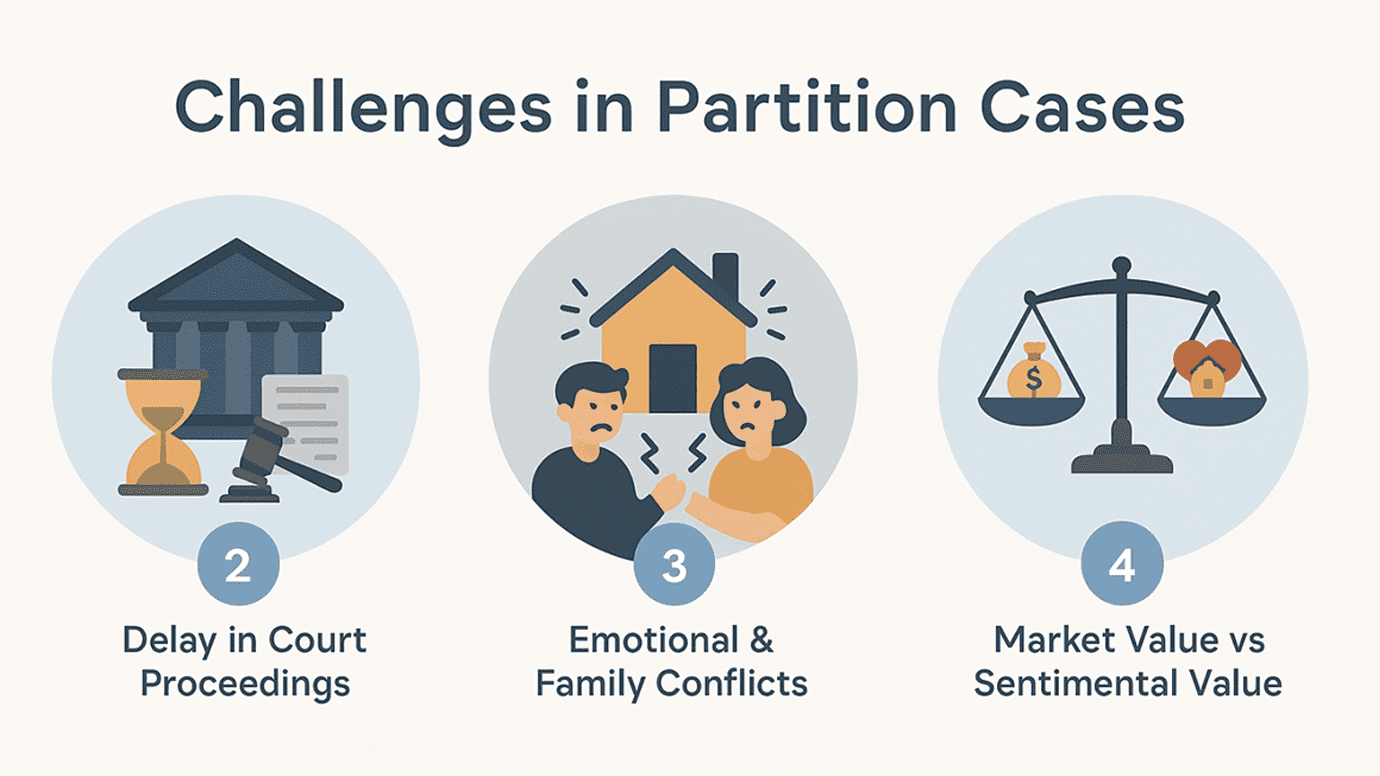
Delay in Court Proceedings
- One of the biggest challenges in the partition suit procedure is the delay caused by lengthy court processes.
- Partition cases often involve multiple parties, documentary evidence, and verification of ownership rights, which can stretch the case over several years.
- Even when the court orders the sale of partition land, the execution may take time due to administrative bottlenecks.
- This delay not only prolongs dispute but also escalates tensions among co-owners.
Emotional and Family Conflicts
- Unlike commercial disputes, family property disputes are often rooted in emotions and relationships.
- For instance, in a property dispute between brothers, one brother may prioritize sentimental attachment to the ancestral home, while the other demands a fair market share.
- These emotional elements complicate the process of legal partition, as family members may resist practical solutions like selling the property.
- Such conflicts can turn a simple partition case into a prolonged battle, making the role of the Partition Act and the courts even more crucial.
Market Value vs. Sentimental Value
- Another common issue in partition of property in India is the clash between market value and sentimental value.
- A piece of partition land may hold deep emotional significance for one co-owner, while another co-owner may focus only on its financial worth.
- This often leads to disputes over valuation during the partition suit procedure, especially when deciding whether to sell or physically divide the property.
- Courts must balance these competing interests under the Partition Act to ensure both fairness and sensitivity in their judgments.
The Partition Act provides solutions for family property disputes, but challenges like judicial delays, emotional conflicts, and valuation disagreements often complicate the process. Whether it is a boundary disputes, or the partition of joint family property, these issues require careful handling under Indian partition law. By recognizing these challenges, co-owners can approach the process with realistic expectations and seek professional legal guidance for smoother resolution.
You can also read our comprehensive blog on Joint Property Ownership Disputes and get insights on it.
Why Legal Assistance is Crucial in Partition Cases
Resolving family property disputes under the Partition Act 1893 may seem straightforward in theory, but in practice, it often involves complex legal, financial, and emotional challenges. Whether the issue is a boundary dispute, or disagreements over the partition of joint family property, hiring an experienced property dispute lawyer is essential for navigating the intricacies of partition law.
Expertise in Partition Law and Court Procedures
- A lawyer specializing in partition of property in India understands the nuances of the Partition Act and related statutes.
- They can guide clients through the partition suit procedure, ensuring that all documents, evidence, and claims are properly presented in court.
- Without professional legal assistance, co-owners may struggle to file or defend a partition case, which could result in delays or unfavorable judgments.
Accurate Property Valuation
- Determining the fair value of partition land or inherited assets is often a major point of contention in family property disputes.
- A lawyer works with valuation experts to ensure that the property is neither undervalued nor overvalued, protecting the financial interests of their client.
- This is especially important when the court orders a sale instead of an act of partition, as valuation directly affects the distribution of sale proceeds.
Skilled Negotiation and Mediation
- Many partition cases are settled outside of court through negotiation or mediation, saving time, money, and emotional strain.
- A lawyer can negotiate fair terms, helping avoid prolonged family property disputes.
- For example, in a property dispute between brothers, a lawyer may help one brother buy out the other’s share, preventing escalation into a full trial.
Effective Litigation in Court
- When negotiation fails, a lawyer represents the client in court to ensure a just outcome.
- From filing the suit under the partition act 1893 to ensuring compliance with the partition suit procedure, legal professionals manage every step of litigation.
- They also make sure that the court’s decision—whether it involves an act of partition or the sale of property—is enforced properly, protecting the client’s rights.
The complexities of the partition of property in India make it nearly impossible to achieve fair results without professional guidance. An experienced lawyer not only ensures proper compliance with the Partition Act but also helps clients navigate sensitive issues like valuation, negotiation, and litigation. To know more in detail, you can go through our dedicated page on Property Dispute Lawyer.
FAQs
A. The Partition Act 1893 was enacted to provide a fair mechanism for resolving disputes over the partition of property in India. It allows courts to decide whether physical division is possible or whether the property should be sold and proceeds distributed among co-owners.
A. Any co-owner of a property can initiate a partition case by following the partition suit procedure in a civil court. This right applies in matters involving ancestral houses, agricultural fields etc.
A. The Act provides remedies such as filing a partition suit, requesting a sale of the property when division is not possible, and allowing co-owners to buy each other’s shares. These ensure a fair legal partition of property in complex situations.
A. Yes, under the Partition Act 1893, if the court determines that an act of partition would be impractical, it may order the sale of the property. The proceeds are then distributed among co-owners, ensuring justice in cases of partition of property in India.
A. Typical challenges include delays in court proceedings, emotional conflicts in family property disputes, and disagreements over property valuation. For example, dividing land may lead to conflicts over sentimental versus market value.
A. An experienced lawyer helps navigate the complexities of partition law, ensures proper valuation of property, and represents clients in court. Legal guidance is crucial for achieving a fair legal partition of property, especially in sensitive matters like the joint family property.
A. Co-owners benefit by having clear legal remedies under the Partition Act. Whether through sale of partition land, or exercising the right to buy another’s share, the Act ensures that disputes over the partition of property in India are resolved fairly.
A.The court ensures that the partition suit procedure is properly followed. It decides whether a legal partition through physical division is possible or whether a sale is necessary, guaranteeing fair distribution among all co-owners.
Conclusion
The Partition Act 1893 remains one of the most important safeguards in Indian partition law, providing co-owners with effective remedies when disagreements over the partition of property arise. Whether the dispute involves an ancestral home, or commercial property, the Act ensures that fairness prevails. By allowing courts to order an act of partition or, where necessary, a sale and distribution of proceeds, it balances both practical realities and the rights of co-owners.
For individuals facing family property disputes, such as boundary disputes, or disagreements regarding the partition of joint family property, the Act provides structured solutions. The availability of remedies—like filing a partition case through the partition suit procedure, requesting a sale, or exercising the right to buy another co-owner’s share—gives assurance that no one is left without recourse. These legal options make the process of legal partition of property both transparent and equitable.
It is also important to recognize that while the Partition Act offers remedies, navigating the complexities of partition of property often requires professional legal support. An experienced lawyer can guide co-owners through valuation, negotiation, and litigation, ensuring that the process is carried out smoothly and that every party’s rights are protected.
If you are currently dealing with issues related to the partition of property in India, remember that you are not alone. Remedies under the Partition Act 1893 exist to help resolve even the most challenging disputes. Seeking timely legal consultation can help bring clarity, protect your interests, and achieve a fair outcome in matters of legal partition. For more information regarding different cases and disputes, go to our Homepage.
Disclaimer:
This blog on the Partition Act 1893 is meant for general informational and educational purposes only. It should not be treated as legal advice or a substitute for professional consultation. Since every partition case and family property dispute depends on unique facts, the remedies under partition law may differ from one situation to another. Readers are advised to seek guidance from a qualified lawyer for personalized assistance with the partition of property in India.



